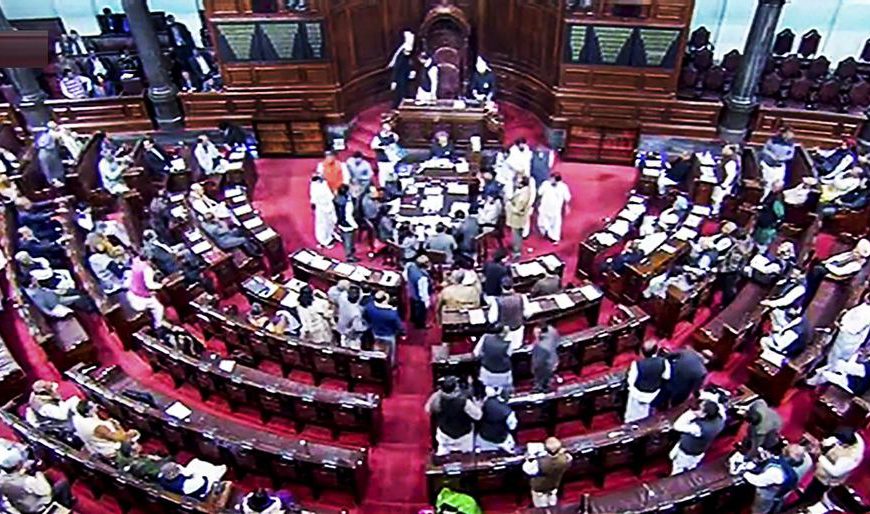P Chidambaram and Rajeev Shukla of the Congress, BJP’s Sumitra Valmiki and Kavita Patidar, former Congress leader Kapil Sibal, RJD’s Misa Bharti and Jayant Chaudhary of the RLD were among the 41 winners declared elected unopposed to Rajya Sabha on Friday. All the 11 candidates in Uttar Pradesh, six in Tamil Nadu, five in Bihar, four in Andhra Pradesh, three each in Madhya Pradesh and Odisha, two each in Chhattisgarh, Punjab, Telangana and Jharkhand and one candidate in Uttarakhand won without a contest.
Of the 41 winners, 14 are from the BJP, four each from Congress and YSR Congress; three each from DMK and BJD; two each from AAP, RJD, TRS, AIADMK, one each from JMM, JDU, SP and RLD besides Independent Sibal.
Elections were scheduled to be held on June 10 to fill 57 Rajya Sabha seats from 15 states that will be falling vacant due to the retirement of members on different dates between June and August. Friday was the last date for withdrawal of candidature.
On June 10, elections will now be held for six seats in Maharashtra, four each in Rajasthan and Karnataka and two in Haryana. Results will be declared the same day.
Of the 11 candidates declared elected in Uttar Pradesh, eight are from BJP, one each from Samajwadi Party and RLD (Rashtriya Lok Dal), along with independent Sibal.
The winners from the state are Jayant Chaudhary (RLD), Javed Ali Khan (SP), Darshana Singh, Babu Ram Nishad, Mithilesh Kumar, Radha Mohan Dal Agarwal, K Laxman, Laxmikant Bajpai, Surendra Singh Nagar, Sangeeta Yadav (all BJP).
The winners from Tamil Nadu are the ruling DMK’s S Kalyanasundaram, R Girirajan and KRN Rajesh Kumar, AIADMK’s C Ve Shanmugam and R Dharmar and Congress’s Chidambaram.
In the Upper House, the DMK’s current strength of 10 would continue to unaltered and AIADMK representation is set to slide to 4 MPs from 5 members. With Chidambaram’s election, the Congress party would have a member from Tamil Nadu in the Rajya Sabha after a long gap. In 2016, Chidambaram was elected to the Rajya Sabha from Maharashtra and his term ends on July 4.
All five candidates from Bihar were elected unopposed – Misa Bharti and Faiyaz Ahmed (RJD), Satish Chandra Dubey and Shambhu Sharan Patel (BJP), and Kheeru Mahto (JDU).
Bharti, the eldest daughter of RJD supremo Lalu Prasad, and Dubey shall be enjoying their second consecutive terms.
V Vijayasai Reddy, Beeda Masthan Rao, R Krishnaiah and S Niranjan Reddy of the ruling YSR Congress were also elected unopposed from Andhra Pradesh. With this win, the strength of the YSRC has now increased to nine in Rajya Sabha, out of 11 from the state, with the TDP and the BJP having one member each.
Vijayasai has been re-elected for the second consecutive term.
AAP candidates — noted environmentalist Balbir Singh Seechewal and entrepreneur-social activist Vikramjit Singh Sahney — were declared winners in Punjab.
The terms of Rajya Sabha members from Punjab Ambika Soni (Congress) and Balwinder Singh Bhunder (Shiromani Akali Dal) are due to expire on July 4.
In March, the AAP had nominated former cricketer Harbhajan Singh, AAP leader Raghav Chadha, Lovely Professional University founder Ashok Mittal, former IIT Delhi faculty Sandeep Pathak and industrialist Sanjeev Arora for Rajya Sabha. They all were elected unopposed from Punjab.
In Chhattisgarh, both the nominees of the ruling Congress – Shukla and Ranjeet Ranjan – were elected unopposed. The Opposition BJP did not field its candidate in view of its low strength in the state assembly.
Of the five Rajya Sabha members from Chhattisgarh, the terms of two – Chhaya Verma (Congress) and Ramvichar Netam (BJP) – are set to expire next month.
The other three Rajya Sabha members from the state are KTS Tulsi and Phulodevi Netam of the Congress and Saroj Pandey of the BJP. JMM’s Mahua Maji and BJP’s Aditya Sahu were declared elected unopposed from Jharkhand.
BJP candidate from Uttarakhand, Kalpana Saini, was also elected unopposed and will fill the lone seat to the upper house after the term of Congress’s Pradeep Tamta ends on July 4.
The BJD won all the three seats in Odisha and the TRS both the seats in Telangana.
In Maharashtra, the Shiv Sena and the BJP will battle it out for the sixth seat of Rajya Sabha as none of the seven candidates in the fray – four of the ruling Maha Vikas Aghadi (MVA) and three of BJP – withdrew their nomination.
This will be for the first time in more than two decades that the state will see election to the Upper House of the Parliament. The last such election was in 1998, where the Congress candidate Ram Pradhan had lost despite the party having enough numbers in its favour.
Six candidates are in the fray for the polls to four seats from Karnataka. Despite not having an adequate number of votes to win the fourth seat, BJP, Congress and JD(S) have fielded candidates for the seat, forcing an election.
Meanwhile, keen contests for the four seats in Rajasthan and two in Haryana are on the cards as none of the candidates withdrew their candidatures on the last day.
The Congress is expecting three seats in Rajasthan and the BJP is one of its own and is supporting an independent and media baron Subhash Chandra for the fourth seat.
In Haryana, Congress has fielded Ajay Maken for one seat and the BJP has fielded one candidate and is supporting another independent candidate and media baron Kartikeya Sharma for the second seat.

